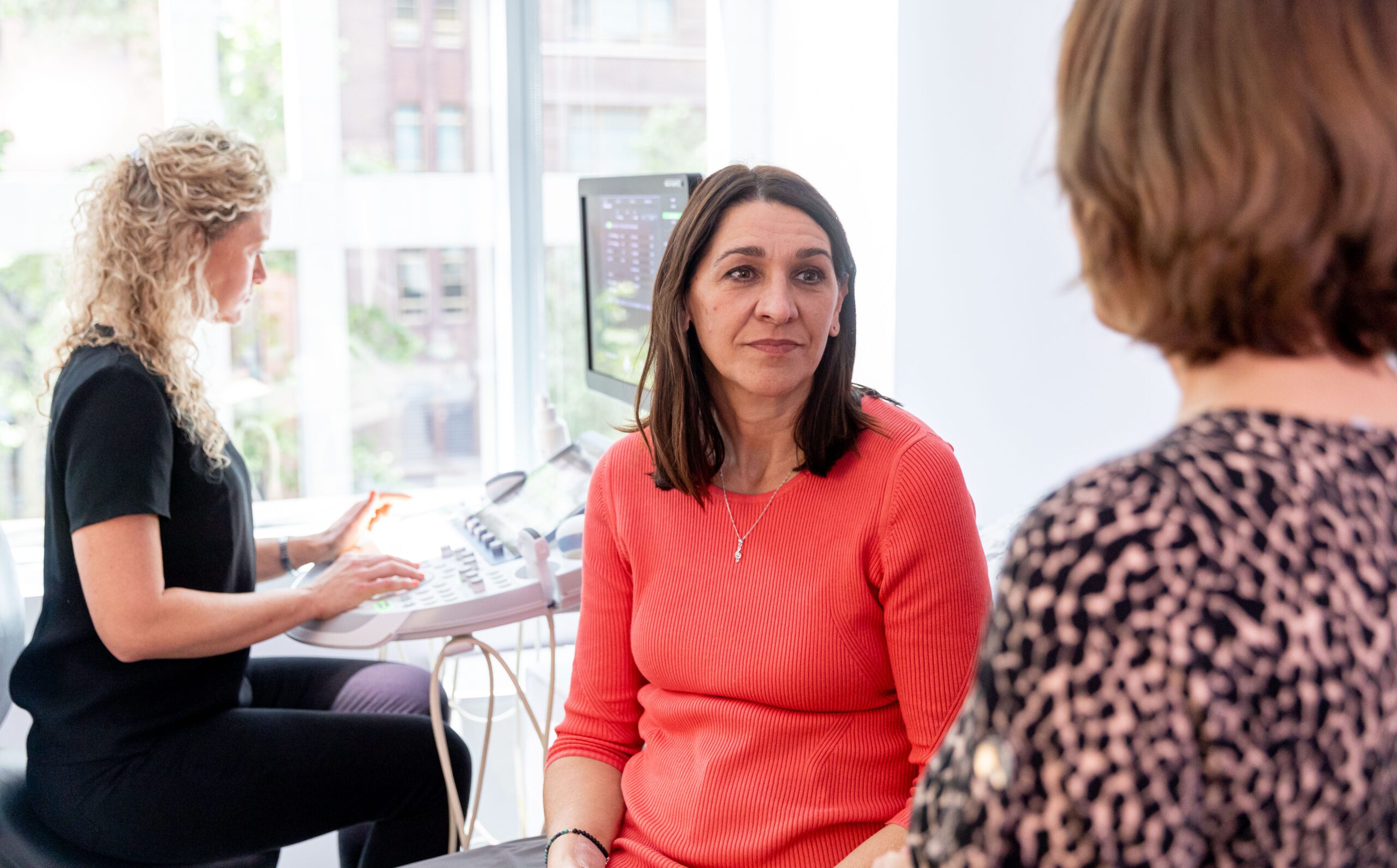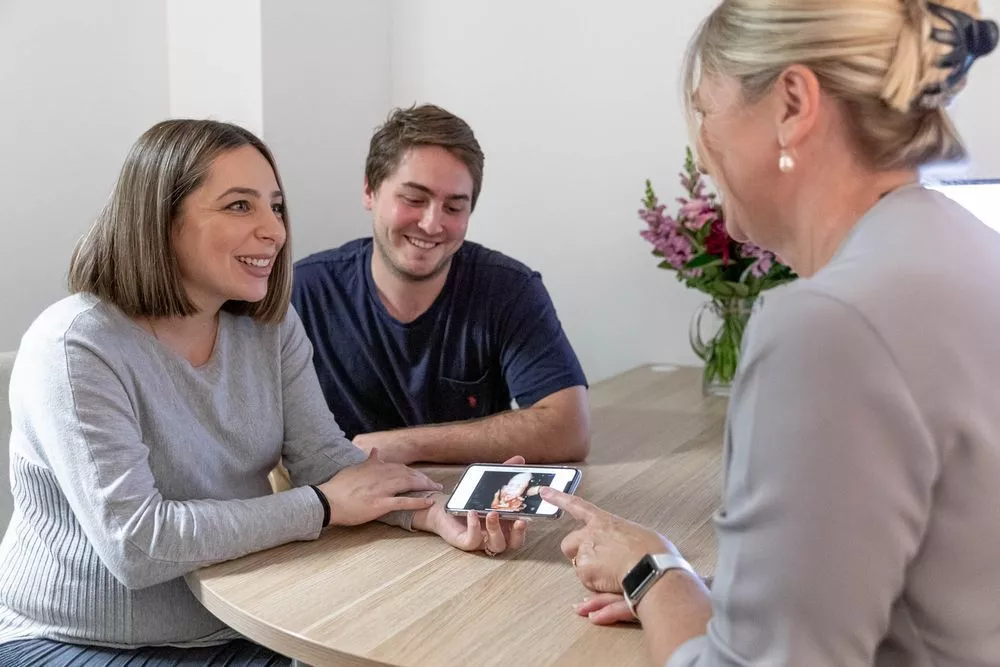Congratulations – you’re pregnant!
At 6 weeks gestation your baby is about the size of a pea with lots of changes and growth happening, and by 7 weeks, baby is about the size of a blueberry.
6 to 7 weeks gestation is the time that Ultrasound Care recommends ultrasound and an early dating scan for high risk pregnancies.
At 6 weeks gestation your pregnancy test will be positive. A transvaginal ultrasound examination may show a tiny sac in the lining of the womb about 6mm in size. Within the sac is a yolk sac and a tiny fetal pole which is the developing baby.
What is the actual size of the embryo at 6 weeks gestation?
There is some variation, but on average the length of the embryo is about 5mm. Electrical activity may be faintly identified by sensitive ultrasound machines, but this future heart tissue becomes more obvious with advancing gestation. Around the gestation sac is a thick white band of tissue which is called the chorion. This is the future placenta.
What is an early dating scan and why is it recommended?
Sometimes your doctor may ask you to have an early dating scan which is conducted at 6 weeks gestation. This is especially common if you have had an ectopic pregnancy in the past or there are other concerns which may hint to the pregnancy implanting in an unexpected place. The main purpose of the dating scan at this early gestation is to confirm that the pregnancy has implanted into the uterus. Unusual sites for pregnancy implantation include the Fallopian tube, cervix, Caesarean section scars and the abdomen. These sites place the mother at serious risk. The team specialist team of doctors and sonographers at Ultrasound Care are trained to look for these unusual sites and to look for information on ultrasound that will help your referring doctor plan your care.
What can be seen with an ultrasound at 6 weeks gestation?
If the pregnancy is implanted in the uterus, it is common that we may not be able to see the baby’s heart beating at this early stage. In some babies the heart movement is just too small for even the most advanced machines and experienced sonographers to detect. The electrical activity does not always start at the same time for every baby and when it starts it is often intermittent.
You are at 7 weeks gestation
As with 6 weeks gestation, at 7 weeks gestation the pregnancy test will be positive, and your transvaginal ultrasound examination will show a gestation sac in the lining of the womb (uterus) containing fluid and a tiny fetal pole. There is some variation, but on average the length of your baby, which is called an embryo has grown to about 10mm at 7 weeks gestation.
7 weeks gestation is an exciting time for your ultrasound as electrical activity in the developing heart can now be seen. It will be interpreted by the ultrasound machine as a heart rate of 90-110 beats per minute. As your baby develops the heart rate gets faster and may reach up to 170-180 bpm. One of the special nervous systems in the heart start to develop at the end of the first trimester and the baby’s heart rate gradually falls a little.
The heart movements may be too tiny to be audible, but this future heart tissue becomes more obvious with advancing gestation. Around the gestation sac is a thick white band of tissue which is called the chorion becomes thicker, and this is the future placenta.
What to expect at 6 to 7 weeks gestation
At 6 weeks to 7 weeks gestation, your pregnancy will start to feel very real, and your body is starting to undergo significant changes.
At 6 weeks gestation, your embryo is starting to look more baby-like and while it is still curled up in a small ball, it is growing fast and now has an optical ventricle which will eventually become your baby’s eyes. The heart has divided into four chambers and starts to beat at 6 weeks gestation and there are small limb “buds” that will develop into baby’s arms and legs. Your baby’s facial features are also beginning to form.
At 7 weeks gestation, your embryo is generating about one hundred new brain cells every minute! Baby’s brain and heart are becoming more complex, and the kidneys are developing. Your embryo is starting to look more like a baby at 7 weeks gestation with arms and legs that have webbed hands and feet.
What to do at 6 to 7 weeks gestation
Your baby is in the early stages of developing their critical systems. The best start you can give to your baby at this stage is to play it safe. Get extra sleep, keep relaxed and avoid exposure to chemicals and extreme temperatures. Eliminate any harmful diet products, stop drinking alcohol and stop smoking.
If you haven’t already done so, contact your doctor for your first pre-natal visit. They will arrange for any recommended urine and blood tests and will also advise you regarding your first ultrasound examination.
Ultrasound Care recommends the first ultrasound scan be undertaken at 6-7 weeks gestation for high risk pregnancies and otherwise at 8-10 weeks gestation.
If you would like to arrange for an appointment with Ultrasound Care, or find out more about your first ultrasound scan or dating scan; what is involved and what can be seen,
If you would like to find out more about your first ultrasound scan or dating scan and what is involved and can be seen, please click here to visit our Dating Scan page or call us at a location of your choice to arrange for an appointment.






